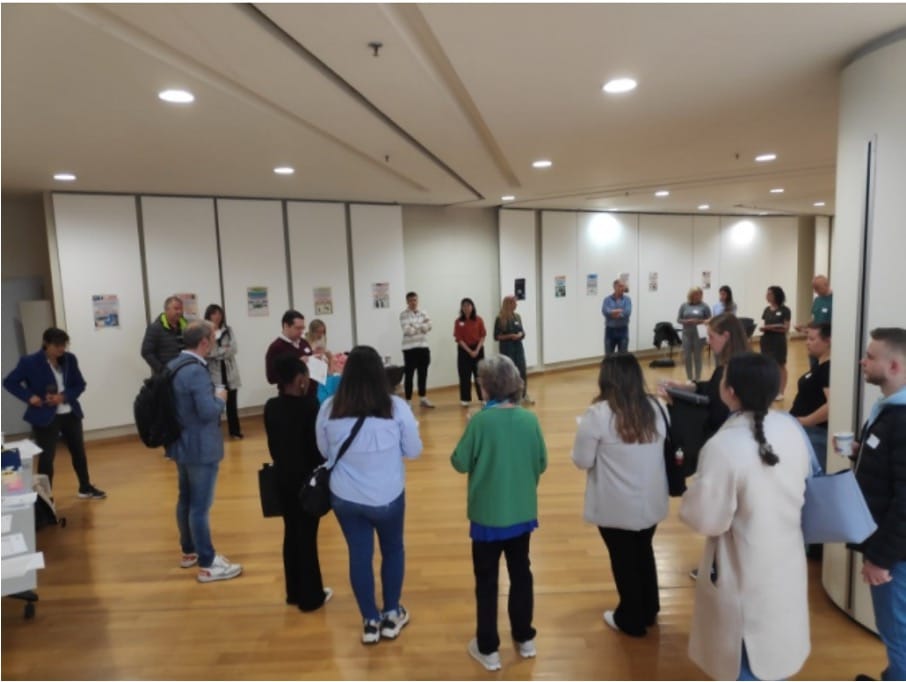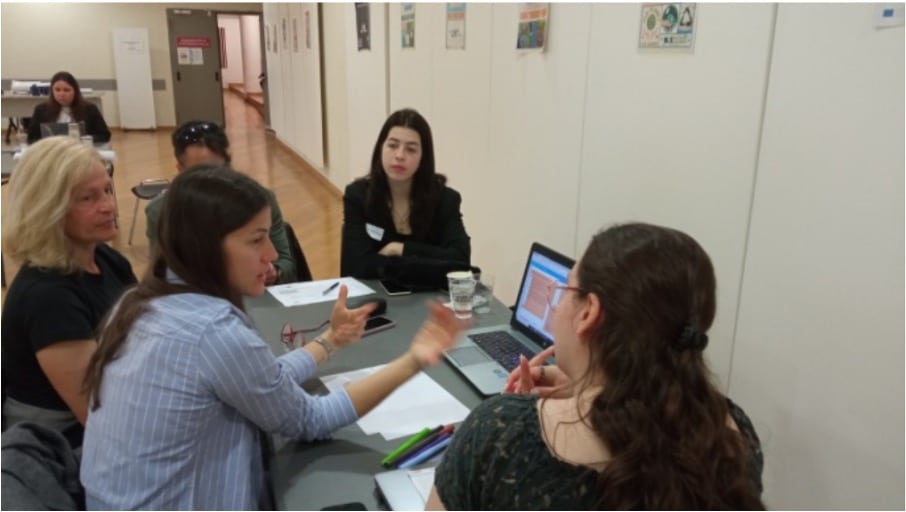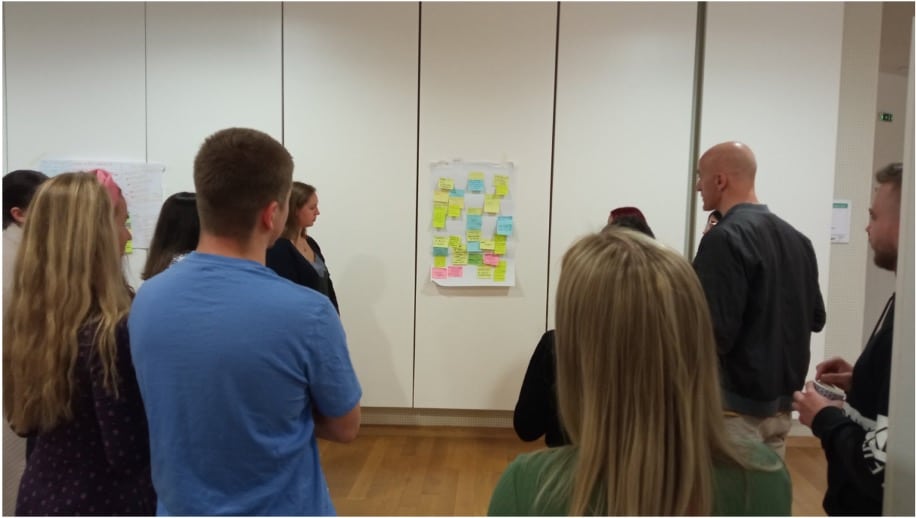The Greek Innovation Forum took place at the Centre for the Dissemination of Research Results (KEDEA), Aristotle University of Thessaloniki on the 14th of April.
The IF aimed to create a dialogic space where participants of different social backgrounds (e.g., young people, educators, institutional actors, and civil society stakeholders) could engage in a reflective and participatory discussion on learning outcomes, trajectories, and exclusion. Other aims were the recontextualization of the CLEAR project’s research findings (particularly from WP4 and WP5) within the Greek socio-educational landscape and the translation of evidence into guiding questions and dialogic processes, through which participants could challenge and reimagine current educational systems, policies, and practices.

The Thessaloniki IF had 38 participants, most of whom were young adults (18 participants) from mixed socio-economic, migrant, and minority ethnic backgrounds. Six policy representatives from the Municipality of Thessaloniki attended the event, working in the departments of education, youth affairs, and Roma inclusion. Four attendees were educators, while another five worked in NGOs. Three professors and researchers from the Aristotle University of Thessaloniki were present, and lastly, two labour market representatives from the tourism and healthcare sectors attended the IF. This is in line with CLEAR’s aim to engage with a broad range of educational stakeholders. In addition, a gender balance was considered, with 21 female and 17 male participants.
The IF started with an opening plenary, where the project and its main findings were presented. After that, an icebreaker activity was conducted to stimulate the discussion among the participants.

They were then divided into six groups, which rotated along six different discussion tables. The rotation ensured that all participants had the opportunity to contribute to each topic throughout the day. Although participants self-rotated across tables, initial placements were carefully facilitated to ensure that each table at any given time included at least one young person, one professional, and – if possible – a mix of genders and institutional roles.
Each group corresponded to a thematic table inspired by CLEAR WP4 and WP5 content, with related discussion questions to be talked about by the participants:
Trajectories Table
“Why do two people with the same school background end up on different paths?” “What helped—or hurt—your sense of possibility?”
Second Chance Table
“What made you return—or what stops people from returning—to learning?” “What would make second-chance learning feel like a real option?”
Recognition Table
“What have you learned outside of school that no one sees?” “How should the system acknowledge what migrants and informal learners know?”
Participation Table
“When did someone really listen to your voice in school?” “What does real participation look like—not just consultation?”
Assessment Table
“What does the grade say—and what does it hide?” “What would assessment look like if it respected your journey?”
Success Table “When you hear the word ‘success’, who do you picture?” “How would you define success in your own terms?”
Conclusion
After the group discussions, a final plenary session concluded the IF to reflect upon the group activities and the discussion questions. In general, the IF was characterized by an open, non-judgmental atmosphere, with particular emphasis on the uniqueness of the space. The narrative approach helped to flatten hierarchies and to generate affective trust among individuals who, normally, would not have come together to discuss educational policies.

The discussion and feedback mainly revolved around five central themes.
- Acknowledging Recognition and Human Dignity
This was especially highlighted by participants from Roma and migrant backgrounds, who were able to share their experiences without feeling stigmatized, othered, or instrumentalized. - Emotional and Reflective Impact
Young people in particular stated that sharing their educational experiences and reflecting upon them stirred various emotions, often framed through technical language, e.g., “outcomes” or “deficits”. - Critical Reflections on Education Systems
Formal education was criticized for its rigid and transactional logic. Educators also voiced the feeling of constraint, by which structural pressures come into conflict with their pedagogical intentions. - Methodological Appreciation and Suggestions
Many participants welcomed the World Café format, but wished for more time to allow in-depth discussions on the topics. NEETs and less formally educated participants appreciated the use of creative methods and visual tools. - Vision for Continuity and Structural Change
While there was appreciation for the format of the IF, many participants demanded continuity and follow-up action to enable sustainable and structural change.
Recommendations for Educational Stakeholders
During the IF, several practical and visionary proposals were issued by the participants.
- Institutionalize Youth Voice Structures
Establish school-based and municipal-level youth councils with decision-making capacity in curriculum, evaluation, and student life planning. - Introduce and Scale Narrative-Based Assessment
Create inclusive assessment alternatives, such as narrative, formative, and portfolio-based evaluation methods across Second Chance Schools, VET institutions, and general education. - Develop a National Recognition Framework for Informal and Migration-Based Learning
Establish decentralised hubs (e.g., in universities, NGOs, municipalities) that support the validation of life competences through narrative tools and learner-designed portfolios. - Embed Empathy and Co-Design in Teacher Training
Reform teacher education to include training on intergenerational communication, structural empathy, and participatory pedagogy. - Redefine ‘Success’ through Curriculum and Media Integration
Integrate various narratives of success into media such as textbooks, school displays, and public campaigns, with special attention given to non-linear, community-based, and creative pathways. - Bridge Formal and Non-Formal Education Systems
Create mobility frameworks that allow for smooth transitions between non-formal learning environments (e.g., youth centres, NGOs) and formal systems like VET and SDE. - Ensure Long-Term Forum Continuity and Local Adaptation
Encourage official authorities, such as municipalities and ministries, to adopt the CLEAR Innovation Forum model as an established civic practice to foster inclusive dialogue on educational policy.
